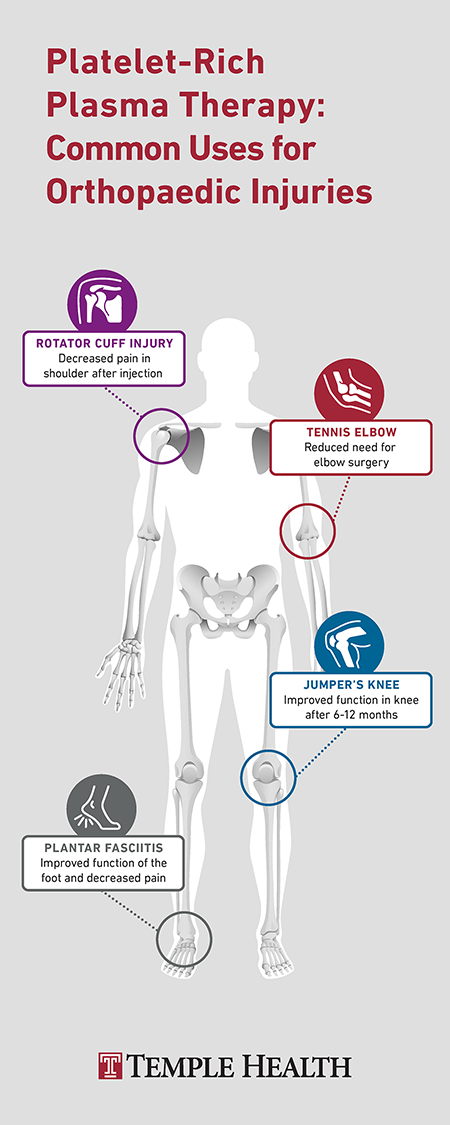If you have chronic joint, muscle or tendon pain from an orthopaedic condition like bursitis or tendonitis, you may have heard of platelet-rich plasma therapy (PRP therapy).
First used among professional athletes to relieve pain from acute sports injuries, PRP is a regenerative therapy that uses the power of your body’s own platelets to relieve pain and heal damaged tissue.
How Does PRP Therapy Work?
Platelets are “helper” cells that come to your rescue when you have an injury. By binding to your damaged blood vessels, platelets form blood clots that act as Band-Aids to stop you from bleeding. Platelets also contain growth factors, a type of protein that helps grow new cells, repair tissues and reduce inflammation. It’s these growth factors that are thought to help initiate healing in certain cases.
Although studies are ongoing, platelet-rich plasma therapy shows promise in helping to relieve pain and heal many orthopaedic injuries.
PRP Treatment for Orthopaedic Injuries
Here are some common orthopaedic conditions that may benefit from this therapy:
1. Tennis elbow (lateral epicondylitis)
Despite its name, tennis elbow is used to describe elbow pain and inflammation that occurs with any repetitive movement of the arm and wrist. This could certainly result from playing tennis a few times a week, but can also be related to working on a computer all day.
Common treatments include:
- Ice
- Rest
- Anti-inflammatory medications
But recent studies suggest PRP therapy may also help relieve symptoms and reduce the need for surgery.
2. Jumper’s knee (patellar tendonitis)
Jumping and landing in sports such as basketball and volleyball can lead to overuse of your knee joint. This chronic injury known as jumper’s knee affects the tendon that connects your kneecap to your shin bone, causing pain and swelling.
Common symptoms include:
- Pain when you walk, run or jump
- Pain with bending or straightening your leg
Early PRP therapy studies show improvement in pain and function within 6 to 12 months after the injection.
3. Rotator cuff injury
The tendons and muscles that surround your shoulders are called rotator cuffs. Rotator cuff tears or injuries often result from sports- or work-related activities, or from a single traumatic event.
Symptoms include:
- “Clicking” in your shoulder when you raise your arm
- Swelling in the front of your shoulder
- Limited range of motion
- Pain
Studies are ongoing to evaluate the effectiveness of platelet-rich plasma therapy for the treatment of rotator cuff injury, but an encouraging study showed that PRP injections resulted in decreased shoulder pain over time.
4. Plantar fasciitis
Plantar fasciitis causes swelling in the tendon that connects your heel bone to the toes in your feet. This condition causes a stabbing pain in the bottom of your foot and is at its worst in the morning just after your feet hit the floor.
Plantar fasciitis is common in runners but may occur with other sports activities that require a lot of footwork. Age and weight are also factors.
Many studies have been conducted on the effectiveness of PRP therapy in the treatment of plantar fasciitis. Results suggest PRP injections can decrease pain and improve function.
What to Expect
If you decide to have platelet-rich plasma therapy, your doctor will take a blood sample, then separate your platelets from your blood in a machine called a centrifuge. Those platelets will then be injected into the area of injury to start the healing process.
Find Out If PRP Therapy Is Right for You
If you’re experiencing joint pain or suffer from sports-related injuries, consider scheduling an appointment with a Temple sports medicine specialist to discuss how platelet-rich plasma therapy may be an option for you.
Request an appointment or call 800-TEMPLE-MED (800-836-7536).
